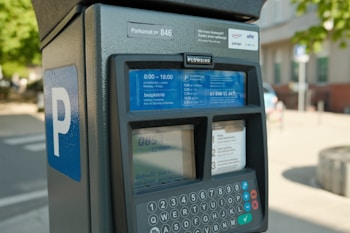 A1 - Beginner Spanish
A1 - Beginner Spanish
The A1 level is for students with no prior knowledge of Spanish.
Students typically complete this level when they can interact with others by asking and answering questions about yourself and where you live.
Based on the widely used Instituto Cervantes Spanish learning levels.

(el) centro
(El) centro is a Spanish word that refers to a specific position or point. In English, it is generally translated as 'the centre'. It could refer to a physical, geographical, or conceptual point that is equidistant from the boundaries or it could refer to a place where certain activities are concentrated. For example, when used in phrases such as 'el centro de la ciudad', it indicates the middle or the heart of the city, usually the busiest part. When referred to a circle, 'el centro' would mean the point that is equally distant from the boundary of the circle.
Example sentences with (el) centro →
(pantalones) vaqueros
The term '(pantalones) vaqueros' in Spanish refers to a specific type of clothing known as 'jeans' in English. Originating from the American West, these are typically pants made from denim or dungaree cloth, often blue in color, and are a staple in modern wardrobes around the world. The term 'vaquero' has its roots in the Spanish word for cowboy, giving a nod to the origins of this style of pants.
Example sentences with (pantalones) vaqueros →
(super)mercado
The Spanish word '(super)mercado' translates to '(super)market' in English. It refers to a physical or virtual platform where buyers and sellers meet to exchange goods and services. When it is prefixed by 'super', it generally refers a large form of grocery store that also sells non-food products, such as clothing or household items. It's notable that both the English and Spanish words carry similar cultural and economic connotations.
Example sentences with (super)mercado →
abogado
'Abogado' refers to a person who practices or studies law, typically a lawyer or a legal scholar. The term generally refers to a male lawyer.
Example sentences with abogado →
abuelo
The Spanish word 'abuelo' is translated to English as 'grandpa'. The term 'abuelo' is a familiar and affectionate way to refer to a male grandparent in Spanish-speaking cultures, encompassing both paternal and maternal grandfathers. The term is widely used in all Spanish-speaking countries and regions, making it a common term in the Spanish language. An 'abuelo' is an older male family member, specifically the father of one's own parents, who traditionally plays a role of works as a source of wisdom and guidance in the family.
Example sentences with abuelo →
actor
'Actor' in Spanish and English are cognates, words that have a common etymological origin. In both languages, this term refers to a person, typically a man, who portrays a character in a performance.
Example sentences with actor →
actriz
The term 'actriz' refers to a female performer in movies, television shows, or theater. It is the equivalent of 'actress' in English.
Example sentences with actriz →
aeropuerto
In Spanish, 'aeropuerto' refers to an 'airport' in English. An air transport hub for planes to land and take-off.
Example sentences with aeropuerto →
agua (mineral) con gas
The Spanish phrase 'agua (mineral) con gas' directly translates to 'water (mineral) with gas' in English. This phrase is commonly used to refer to carbonated or sparkling water, a refreshing beverage often served in restaurants or consumed as a softer alternative to soda. The '(mineral)' part indicates that the water comes from a mineral spring, and 'con gas' represents the added carbonation.
Example sentences with agua (mineral) con gas →
agua (mineral) sin gas
The Spanish term 'agua (mineral) sin gas' translates to 'water (mineral) without gas' in English. This is a common term used in Spanish-speaking regions to refer to still or non-carbonated mineral water. Mineral water is water from a mineral spring that contains various minerals, such as salts and sulfur compounds. The 'sin gas' part indicates that this mineral water is not carbonated or fizzy. This is the type of water that you would typically get if you ask for water in a restaurant and specify that you don't want it to be sparkling or carbonated.
Example sentences with agua (mineral) sin gas →
alegre
The Spanish term for 'merry' is 'alegre'. It is often used in similar contexts to English, to describe things that are cheerful, bright or lively. For instance, when wishing someone a 'Merry Christmas' in Spanish, you would say 'Feliz Navidad'. The term can also describe a person's mood, as in being in a merry or happy mood, which would translate to 'estar alegre'.
Example sentences with alegre →
alemán
The Spanish word 'alemán' translates to 'German' in English. It could refer to the German language, a person from Germany, or anything related to the country Germany, similar to how 'German' is utilized in English. Its use can vary depending on the context, just like other adjectives denoting nationality or language.
Example sentences with alemán →
alquilar un piso
The Spanish phrase 'alquilar un piso' translates to 'rent a flat' in English. This is a common phrase used in Spain when someone is looking to rent an apartment or a flat. Other Spanish-speaking countries might use different words for 'piso', like 'departamento' or 'apartamento', but 'alquilar' remains the word for 'rent'.
Example sentences with alquilar un piso →
ama de casa
The Spanish phrase 'ama de casa' roughly translates to 'housewife' in English. The noun 'ama' can be understood as 'mistress' or 'lady', and 'de casa' implies 'of the house'. So, an ama de casa is a woman who manages her house by doing all the routine chores and maintenance, mostly without employment outside the home.
Example sentences with ama de casa →
animal
The word 'animal' in Spanish is also 'animal', pronounced slightly differently. In Spanish, the word is used to refer to any member of the animal kingdom, including humans. The word can be used in various contexts, just like in English, and can refer to both wild and domesticated creatures.
Example sentences with animal →antipático
The Spanish word 'antipático' translates to 'antipathic' in English. It is primarily used as an adjective in Spanish and describes a person who is unsympathetic, unlikable, or unpleasant. It can also be used to depict a lack of friendliness or goodwill towards other people. This word's antonym is 'simpático', which stands for a likable or pleasant person. So, if you come across an individual who seems unfriendly, the word 'antipático' would be an appropriate term to apply.

aparcamiento
The word 'aparcamiento' in Spanish translates to 'parking' in English. It is primarily used in reference to the action of bringing a vehicle to a halt in a designated area or space where it can be left temporarily. This word is typically used in Spain more so than in Latin America. In usage, it is commonly found in contexts referring to roadside or controlled parking facilities, as well as in general discussions about driving or traveling. When visiting Spanish-speaking countries, this term could be very useful, especially if you are driving and need to find a place to park your vehicle.
Example sentences with aparcamiento →
apartamento
The Spanish word 'apartamento' translates to 'apartment' in English. An apartment refers to a set of rooms for living in, usually on one floor and part of a larger building. Apartments can vary in size and typically include amenities such as a kitchen, bathroom, and living area. They are a type of housing unit that are typically rented by tenants.
Example sentences with apartamento →
aprender
This verb denotes gaining knowledge or understanding of a subject. It is a regular -er verb.
Example sentences with aprender →
árbol
The English word 'tree' translates to 'árbol' in Spanish. In a Spanish sentence, you can use it the same way as in English. For instance, 'Veo un árbol' means 'I see a tree'. Just like in English, it can also be used in various expressions, proverbs, or metaphors.
Example sentences with árbol →
arroz
Arroz is the Spanish word for 'rice', a mainstay in many traditional dishes. Whether in paella in Spain or moros y cristianos in Cuba, rice is omnipresent in Hispanic cuisine, making 'arroz' a crucial term for learners.
Example sentences with arroz →
ascensor
The Spanish word 'ascensor' translates to 'elevator' in English. An elevator is a type of vertical transportation that moves people or goods between floors of a building, vessel, or other structures. Traditionally, these are powered by electric motors that either drive traction cables and counterweight systems or pump hydraulic fluid to raise a cylindrical piston. 'Ascensor' may be used in various contexts, for instance, in structures such as buildings, ships or even for specialized equipment at construction sites.
Example sentences with ascensor →
autobús
A bus can be defined as a large vehicle that is designed to carry many passengers. Buses are typically used for public transportation.
Example sentences with autobús →
avenida
The Spanish word 'avenida' translates to 'avenue' in English. It signifies a broad road in a town or city, normally having trees at regular intervals along its sides. The term can also attribute to a way of approach or access. In general context, it represents a broad road in an urban setting. English speakers, while learning Spanish, can familiarize themselves with 'avenida' as it equates to their understanding of an 'avenue'.
Example sentences with avenida →
banco
In Spanish, 'banco' refers to a financial institution where customers can save or borrow money. For example, 'Voy al banco a sacar dinero', which means 'I am going to the bank to withdraw money'. It can also mean a 'bench' or 'seat', relying on context for the correct interpretation.
Example sentences with banco →
biblioteca
A 'Biblioteca' is a place where you can find various collections of books and other resources like CDs, DVDs, and sometimes even accessible computers for internet usage. It is a place regular visited by students and individuals for reading and researching.
Example sentences with biblioteca →
bocadillo
The Spanish word 'bocadillo' translates to 'sandwich' in English. It is a popular snack in Spain and is crafted by cutting a baguette lengthways and filling it with ingredients. These ingredients could be a range of items such as ham, cheese, omelet, or other local favorites. The word 'bocadillo' itself can be broken down into 'boca' meaning 'mouth' and the diminutive suffix 'illo', so it can be thought of as a 'little bite for the mouth'.
Example sentences with bocadillo →
bolígrafo
The Spanish word 'bolígrafo' translates to 'pen' in English. It is a common item used for writing and may come in various forms such as ballpoint, fountain, or felt-tip. The term is widely used in Spanish-speaking countries to refer to the tool that uses ink to mark papers or other surfaces.
Example sentences with bolígrafo →
bombero
'Bombero' refers to a person whose job is to extinguish fires. This term generally refers to a male firefighter.
Example sentences with bombero →
budista
The term 'budista' is Spanish refers to 'Buddhist' in English, which is an adjective used to describe anything relating to Buddhism. Buddhism is a major world religion or philosophy that is founded on the teachings of Buddha and encompasses a variety of traditions, beliefs, and spiritual practices. Hence, a 'budista' could be an individual who follows the teachings of Buddha, or it could refer to principles, literature, structures etc., that relate to Buddhism.
Example sentences with budista →